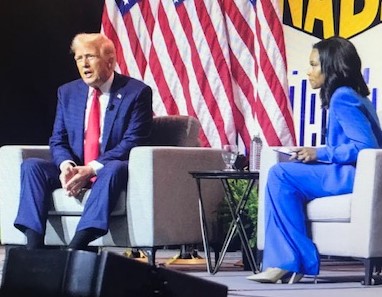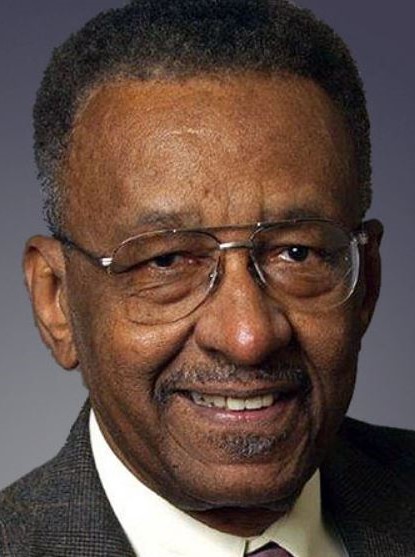Commentary
“What about Lyndon Johnson?”
Those were the words of ABC’s Rachel Scott as she interrupted former President Trump, who was stating that he “was the best president for blacks since Abraham Lincoln, during the National Association of Black Journalists’ convention on July 31, 2024.
With that, I wondered how many blacks are unaware, not only of Trump’s record on issues of concern to blacks, but also the racist past of President Johnson who signed the Civil Rights Act of 1957. Obviously, Scott is uninformed, but as a black journalist, she should be better informed.
I once owned a copy of Robert Caro’s book, “The Years of Lyndon Johnson: The Passage of Power,” but I was unable to find it. Fortunately, I found some remarks by Caro on the Internet, because I wanted to provide you with the truth about Johnson.
For two decades in Congress, he was a reliable member of the Southern bloc, helping to stonewall civil rights legislation.
In Senate cloakrooms and staff meetings, Johnson would calibrate his pronunciation of “negro” between “nigra” and “negra” depending on who he was speaking with, southerners or others, according to Caro. Discussing civil rights legislation with men like Mississippi Democrat James Eastland, who committed most of his life to defending white supremacy, he’d simply call it “the nigger bill.”
When Johnson signed the Civil Rights Act, many of the senators believed they had been betrayed by a man they believed to one of their own. Georgia Democrat Herman Talmadge said, “we shall overcome,” adding that he was “sick.”
“It would be tempting, on the 50th anniversary of the Act, while Johnson was celebrated by four living presidents, to dismiss Johnson’s racism as mere code-switching,” wrote Adam Server, in “Lyndon Johnson was a civil rights hero. But also, a racist.” Adding “a clever ploy from an uncompromising racial egalitarian whose idealism was matched only by is political ruthlessness.”
In August 1965, Johnson signed the Voting Rights Act, guaranteeing blacks the right to vote, making it illegal to impose restrictions on federal, state, and local elections designed to deny black this vote.
War on Poverty
Arguably, it was Johnson’s domestic policy, Great Society, with its War on Poverty, designed to help millions of Americans rise above the poverty line, with its social safety net, that built within the black community a permanent loyalty to the Democrat Party. Today, we hear blacks speak of being taken for granted.
Side Stories of Racism
In “Flawed Giant,” biographer Robert Dallek, writing about Johnson’s nomination of Thurgood Marshall rather than a less famous black judge to the Supreme Court, he noted Johnson saying, “When I appoint a nigger to the bench, I want everybody to know he’s a nigger.”
Caro recalls a discussion between Johnson and his sometime chauffer Robert Parker in his book, “Capitol Hill in Black and White,” in which Johnson asked Parker whether he’d prefer to be referred to by his name rather than “boy,” “nigger,” or “chief.” When Parker said he would, Johnson grew angry and said, “As long as you are black, and you’re gonna be black till the day you die, no one’s gonna call you by your goddamn name. So no matter what you are called, nigger, you just let it roll off your back like water, and you’ll make it.”
As I previously wrote
I was disappointed in Trump’s decision to bring up Vice President Harris ethnic heritage, at the convention, questioning was it Indian or black. It was a mistake. Referring to her changing accents in her speeches, it shouldn’t make a difference. If she goes too Southern, like Hillary Clinton did, however, that might call for a joke on Trump’s part
Back to MS Scott
Judging from her rude lumping of three questions of criticism of Trump as she began addressing him at the black journalists’ convention, it was quite obvious she was not going to be objective.
I recalled the words of Thomas Sowell of the Hoover Institution, who once asked, “how many politicians and media people care about facts, when the facts go against their preconceptions?” Instead of getting her preconceptions from colleague George Stephanopoulos, Scott should read the essays of Sowell. I wonder; does she even know who he is?
As a regular contributor of opinion pieces to Investor’s Business Daily, Sowell’s pieces were among my “must reads.”
Prior to the 2016 election, Sowell wrote, “No matter what policy Republicans follow, they are not going to win a majority of the black votes this year, nor perhaps even this decade. There is very little that Republicans could offer to compete with the Democrats’ whole universe of welfare state earmarks.”
Just days after Trump’s win in 2016, Sowell wrote, “the good news is that we dodged a bullet … a Hillary Clinton win would have meant a third consecutive administration dedicated to dismantling the institutions that have kept America free.
“Donald Trump’s victory was a unique American event. It represents the biggest backlash among many elsewhere, against smug elites.
“Donald Trump’s unexpected victory should send a lot o people back to the drawing board to rethink assumptions about many things.”
Another Black Viewpoint
Two years into the Trump presidency, the late Walter Williams, a professor of economics at George Mason University, initially concerned about Trump’s character, spoke highly of his early accomplishments – tax cuts, the reduction of regulations, and the energy boom. He also noted black unemployment hovering around the all-time low at 6.6 percent.
Interestingly, Williams once wrote of his disapproval Trump’s personal character, but later wrote, “he has turned out to be a good president.”
Kramerontheright recommends that politicians, the media, and all voters for that matter, do their homework on the candidates.
May God continue to bless the United States of America








